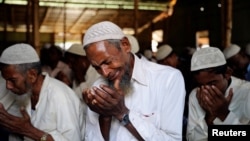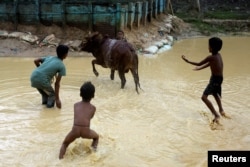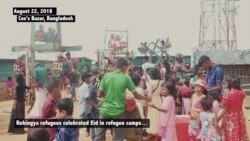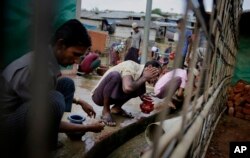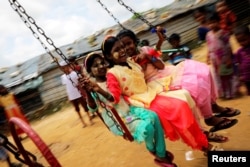As Muslims around the world mark the religious Eid al-Adha — the Festival of Sacrifice — this week, thousands of Rohingya minority members Wednesday joined the celebrations in Bangladesh's refugee camps.
The three-day festival comes nearly a year after more than 700,000 Rohingya refugees fled their homes in Rakhine province of neighboring Myanmar due to a crackdown by Myanmar's army and Buddhist militias.
The refugees started their celebrations at dawn with congregational prayers at makeshift bamboo and tarpaulin mosques, followed by the slaughter of animals as a mark of sacrifice to God.
At Kutupalong, a settlement housing hundreds of thousands of refugees, thousands gathered to perform other traditional rituals such as embracing each other and distributing the sacrificed meat to the needy in the camps.
Meanwhile, children played on wooden carousels and around the muddy fields of the sprawling camps.
Md Nikaruzzaman Chowdhury, chief executive of Ukhia subdistrict, told VOA that more than 2,000 cows were slaughtered for approximately 195,000 refugees on the first day of the festival. He said the sacrificed animals were provided by charity groups and local Bangladeshis.
"We will be getting another 10,000 beef packets for the refugees in the following days," Chowdhury said. "The distribution will continue to ensure meat is delivered to every Rohingya during Eid."
WATCH: Rohingya Refugees Celebrate Eid in Bangladeshi Camps
One Rohingya refugee, who requested anonymity, told VOA that the celebrating refugees were planning to mark the festival by gathering in one field in the camp. He said camp officials prevented the meeting to avoid chaos in the crammed settlement.
"There was no big ground for the prayers, so we decided to perform our Eid prayers in mosques," he told VOA.
Kutupalong is known to be the world's largest refugee camp, with nearly 1 million Rohingya refugees living in an area of 13 square kilometers (8 square miles).
Limited resources
Officials in Bangladesh have complained that the influx of refugees is beyond their capacity, straining already limited resources and causing large deforestation to make space for the refugees in Cox's Bazar.
The government of Bangladesh has sought different ways to reach a solution for the refugee crisis, including an announced deal with the government of Myanmar earlier this year to repatriate the refugees. Another alternative plan by Bangladeshi officials was to relocate the refugees to the newly emerged island of Bhasan Char.
Both proposals have been rejected by humanitarian organizations as further endangering the refugees.
Allegations of torture
Human Rights Watch in a report Tuesday accused Myanmar authorities of torturing and imprisoning Rohingya refugees who returned to Rakhine state from Bangladesh after the August 2017 purge.
Casting doubt over promises made by Naypyitaw officials for the safe repatriation of Rohingya, the international rights watchdog said returning refugees — as young as 16 years old — faced torture and were sentenced to four years of imprisonment.
"The torture of Rohingya returnees puts the lie to Myanmar government promises that refugees who return will be safe and protected," said Phil Robertson, Human Rights Watch's deputy Asia director. "Despite Myanmar's rhetoric guaranteeing a safe and dignified return, the reality is that Rohingya who go back still face the persecution and abuses they were forced to flee."
Terrorism or discrimination?
Myanmar officials are defending their policies in Rakhine province and say their military campaigns only target Rohingya militants.
"We who are living through the transition in Myanmar view it differently than those who observe it from the outside and who will remain untouched by its outcome," Myanmar state counselor and foreign minister Aung San Suu Kyi said Tuesday, while giving a lecture in Singapore.
Suu Kyi said terrorism, not discrimination, was the cause of the crisis in Rakhine and it remains a threat.
"The danger of terrorist activities, which was the initial cause of events leading to the humanitarian crisis in Rakhine, remains real and present today," she said. "Unless this security challenge is addressed, the risk of intercommunal violence will remain. It is a threat that could have grave consequences, not just for Myanmar but also for other countries in our region and beyond."
The United Nations has described Myanmar's military campaign against Rakhine province as "textbook ethnic cleansing" and has reported that the Rohingya people suffered killing, rape and the mass destruction of their homes by the army and Buddhist militias.
VOA's Muazzem Hossain Shakil contributed to this report from Cox's Bazar, Bangladesh.




